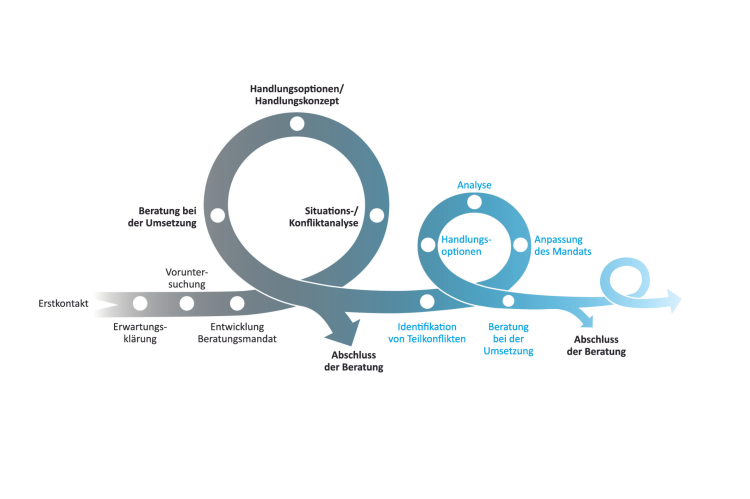
Counselling: How does it work?
The counselling process is individually tailored to local needs. This means that every counselling process is unique - within the guidelines of the Five Principles of LCC.
However, a Pro Peace counselling process typically consists of seven steps:
- Implementing organisations and cooperation partners build mutual trust, clarify expectations and agree on a consultancy mandate (cooperation agreement).
- Individual and group interviews with local citizens and stakeholders are the first step in analysing the situation. They help to ensure that stakeholders can express themselves, that they are heard and that their experiences and views can be incorporated into the further process.
- Using methods from the conflict analysis toolbox, the advisory team draws up a systemic situation and conflict analysis (SCA). It identifies factors for local challenges and reveals dynamics.
- The systemic situation and conflict analysis serves as a foundation for the identification of resources and the joint development of options for action or a concept for action. Appropriate formats (workshops, discussion rounds, working groups) are developed together and supervised by the counselling teams.
- The action plan is discussed, coordinated and, if necessary, expanded with stakeholders from local community. This ensures that the measures are supported by a broad section of local community.
- If required, the advisory teams accompany the implementation of the measures. External experts can also be brought in for implementation if necessary.
- The advisory teams withdraw from the local context and review the process.
Local Conflict Counselling facilitates medium and long-term development processes. It involves a large number of stakeholders at different hierarchical levels, focuses on cooperation and networking between those local stakeholders and uses existing resources. The responsibility for decisions is left with the municipalities. The expertise of Local Conflict Counselling lies in the use of suitable methods that can influence processes, identify opportunities in conflicts and provide impetus for shaping the future. Where necessary, Local Conflict Counselling also draws on experts for specialist topics.
Our Councellors
The counselling is usually carried out by a team of two to three professional counsellors. These include trained mediators, trained systemic counsellors and specialists in civil conflict resolution. Our counsellors have many years of experience in process support, integration work and Dealing with conflicts in an intercultural context. In addition, they have extensive expertise and methodological knowledge in reflecting on and Dealing with conflicts in social systems. They are familiar with municipal administrative structures and processes in Germany and some of them have been active in Local Conflict Counselling for many years. Their external perspective and qualifications enable them to provide new impetus in a potentially polarised environment.
Get in touch!
We will be happy to come around and talk about the specific situation on site and discuss options for counselling together - confidentially and without obligation.
You can find our team here. We look forward to your e-mail!
We developed the approach of local conflict counselling at Pro Peace and implement it together with our partners at K3B - Kompetenzzentrum Kommunale Konfliktberatung des VFB Salzwedel e.V.. The five principles of Local Conflict Counselling were also developed in the course of this cooperation.
Our activities are implemented as part of the project ‘Kommunen im Fokus: Konflikte nutzen - Integration gestalten’. Information on the funding of the project can be found under ‘Sponsors’.

